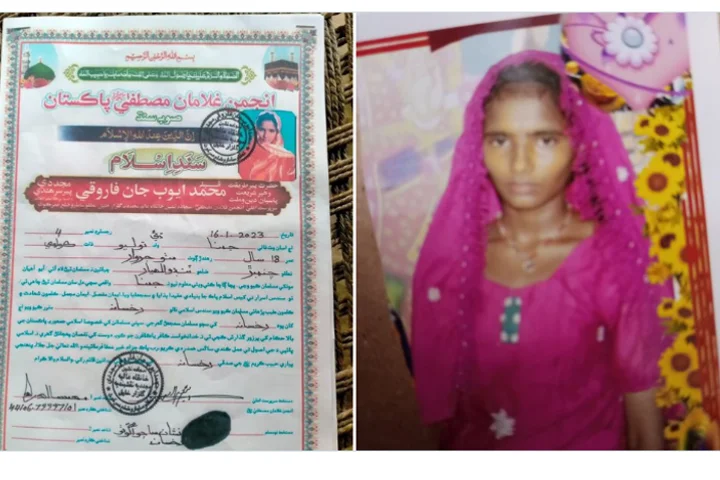

Fourteen-year-old Jamna was abducted and forcefully converted to Islam in Tando Allahyar, Sindh
Pakistan has been asked by a number of UN members including India to stop enforced disappearances and the persecution of minorities at a high level UN meet on Monday.
India hit out at Pakistan at the UN Human Rights Council (UNHRC), Geneva, for subjecting Muslim minorities like the Shias and Hazaras to violence and systemic persecution. Indian envoy to the UN mission, Pawan Badhe said: “People in regions such as Balochistan, Sindh and Khyber Pakhtunkhwa have continued to suffer political repression, persecution, and denial of their rights.”
Germany, Netherlands, Brazil, Paraguay, India, and other countries asked Pakistan to ratify the Convention for the Protection of Enforced Disappeared persons and resolve the issue of custodial killings.
The US and the UK highlighted their concern over the killings of minority groups and religious minorities, especially the Ahmadi community. They also demanded that Pakistan apply democratic policies in governance.
The human rights review of Pakistan is taking place when the situation in Pakistan has drastically worsened for its minorities including Hindu girls. A UN report in mid-January pointed out that underage Hindu girls in Sindh are being abducted, raped and converted to Islam.
UN experts at the launch of the report said: “We are deeply troubled to hear that girls as young as 13 are being kidnapped from their families, trafficked to locations far from their homes, made to marry men sometimes twice their age, and coerced to convert to Islam, all in violation of international human rights law. We are very concerned that such marriages and conversions take place under threat of violence to these girls and women or their families”.
Taking note of the brutalities against the non-Muslim girls, many of whom are as young as 13, the UK unilaterally sanctioned a notorious Pakistani priest Mian Mithoo for the forced conversion of Hindu girls in Sindh. The UK government sanctioned the Muslim cleric, also known as Mian Abdul Haq, of the Bharchundi Sharif shrine in Ghotki “for forced marriages and forced religious conversions of non-Muslims and minors”.
In Balochistan, home to one of the bloodiest conflicts, Pakistan has enforced a media blackout to hide a brutal crackdown on Baloch rebels through drones and helicopter gunships. The Baloch insurgency is so severe that the Pakistani military lost a couple of helicopters in the past six months.
Highlighting the scale of human rights violations in Balochistan, the Human Rights Council of Balochistan (HRCB) submitted a statement to the UNHRC, saying that the Pakistani government carried out 2,725 enforced disappearances and 973 extra-judicial killings between January 2018 and March 2022.
In one of the most macabre incidents that came to light in Pakistan’s Punjab region, nearly 200 rotting corpses were found on the roof of the Nishtar Hospital in Multan city in October 2022. Many activists claimed that the unclaimed and unidentified bodies belonged to Baloch persons who were tortured and killed in custody by the Pakistani security forces.
The UNHRC is holding the Universal Periodic Review (UPR) of Pakistan’s human rights record where many countries have raised concerns about the Islamic country’s inability to protect its religious and ethnic minorities. A similar scrutiny about Pakistan’s human rights situation has been held in May 2008, October 2012 and November 2017.
Also read: Extrajudicial killings, enforced disappearances continue in Balochistan: rights body
Minister for Electronics and Information Technology Ashwini Vaishnaw said on Friday that the government is…
Renowned human rights activist and political analyst Amjad Ayub Mirza has expressed a strong denunciation…
As was widely expected, the Indian economy grew by 6.5 per cent in real terms…
World No Tobacco Day, marked annually on 31 May, addresses a major public health challenge--the…
Defence Minister Rajnath Singh, addressing officers and sailors onboard India's first indigenous aircraft carrier INS…
The leadership team from the Central Tibetan Administration (CTA) arrived in Tokyo to participate in…